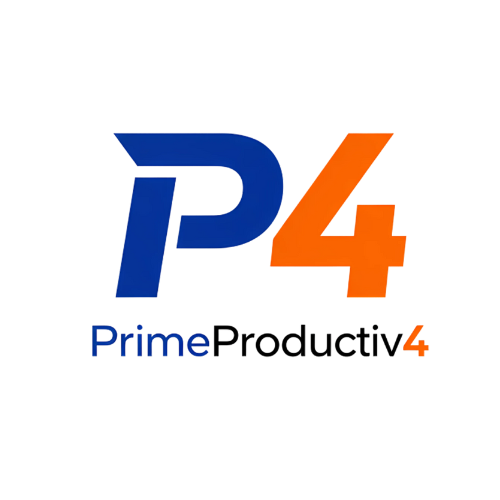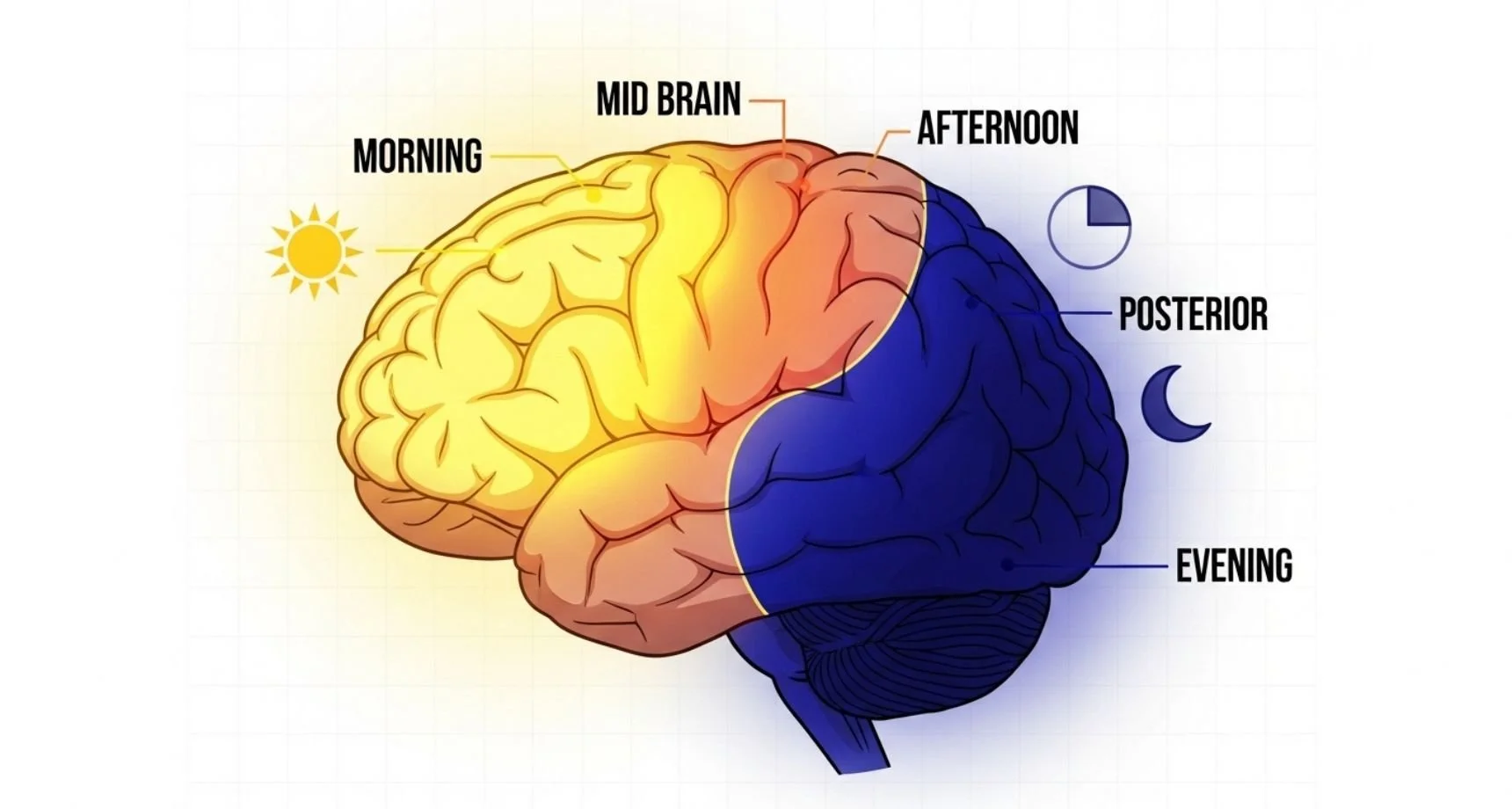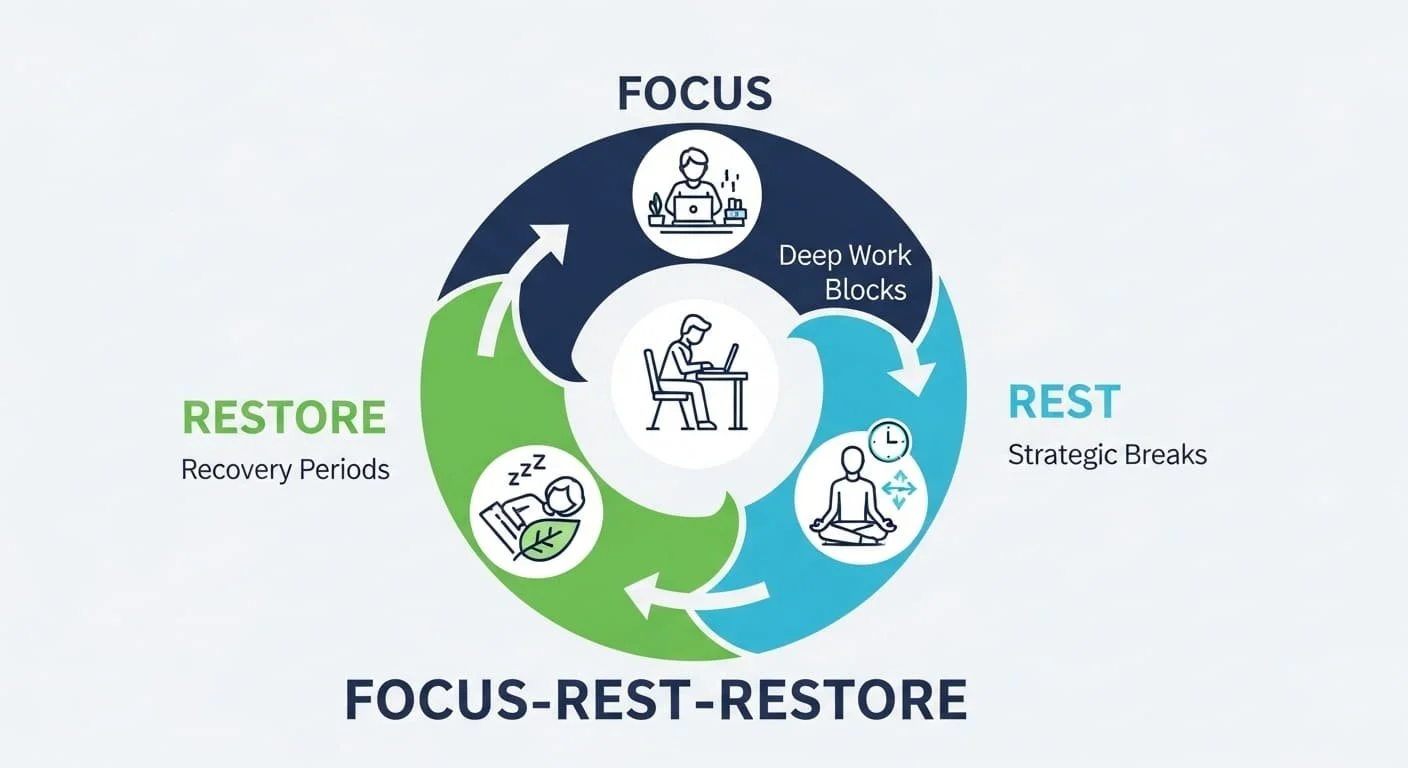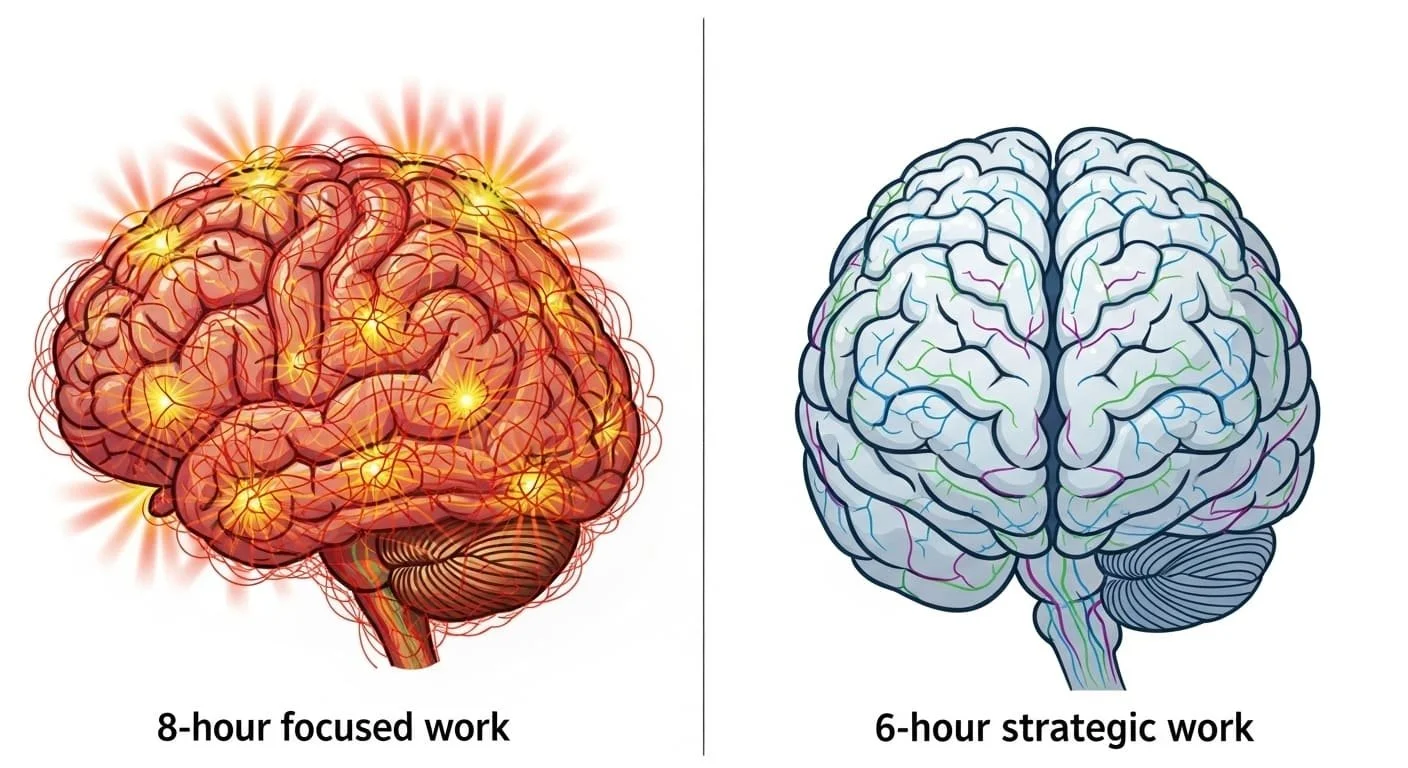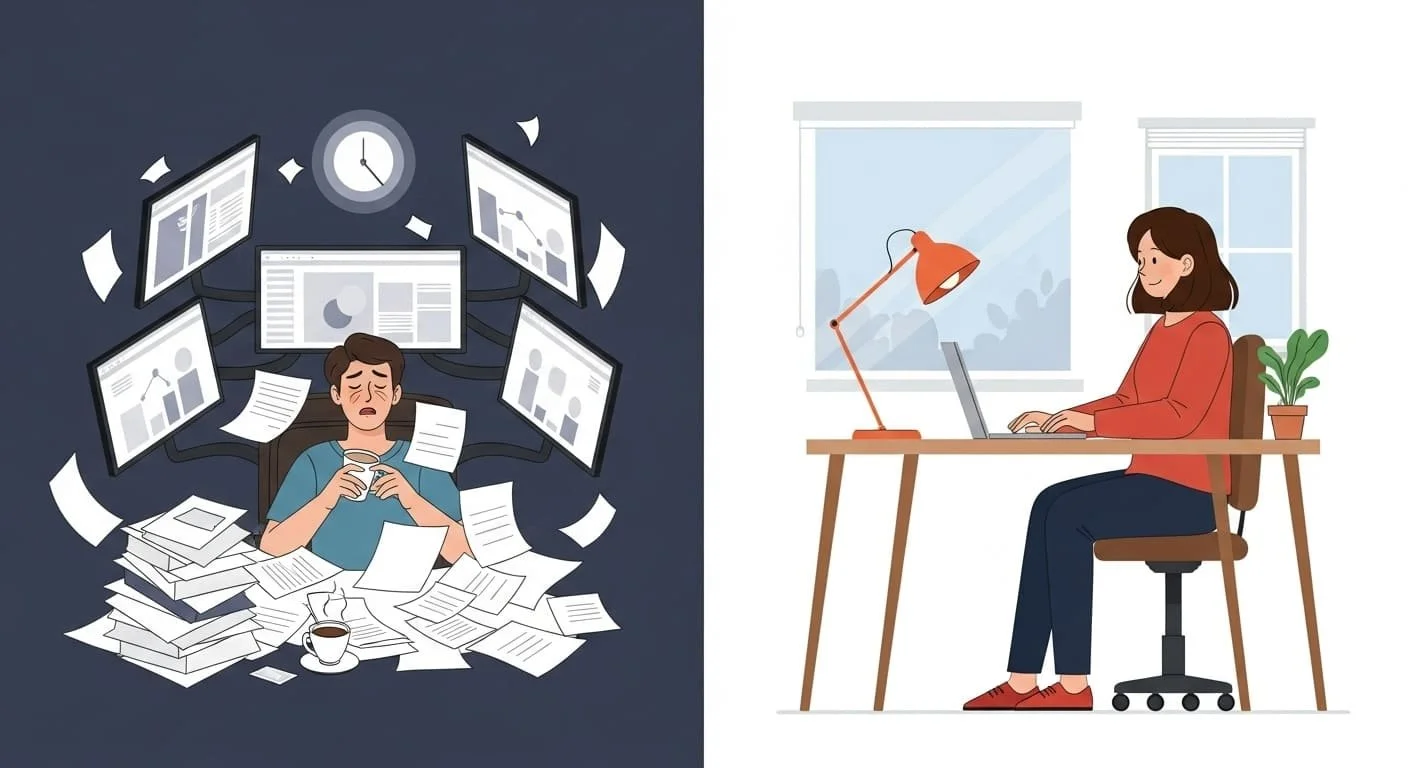Escaping the Hustle Trap: Why Less Work Can Lead to Better Results
Article Summary (Introduction)
Ever notice how the days you work the hardest are the ones where you accomplish the least? You're not imagining it. There's a fascinating psychological trap that catches millions of ambitious professionals every single day: the harder they push, the less they actually achieve. This isn't about laziness or lack of discipline—it's about a fundamental misunderstanding of how human productivity actually works. Recent neuroscience research reveals that our brains aren't designed for the constant hustle culture we've built, and the data is pretty damning: professionals who work 55+ hours weekly are significantly less productive per hour than those capping at 40. The real kicker? Most of us are sabotaging our best work without even realizing it. If you've ever wondered why your marathon work sessions yield mediocre results while your colleague breezes through tasks in half the time, buckle up. This article unpacks the science behind the productivity paradox, exposes the myths keeping you stuck in the hustle trap, and shows you how to actually get more done by—wait for it—doing less.
We've been lied to about productivity. Not deliberately, perhaps, but lied to nonetheless.
The story goes like this: successful people outwork everyone else. They wake at 5am, skip lunch, stay late, and hustle on weekends. More hours equals more output equals more success. Simple math, right?
Except it's complete nonsense. And the science proves it.
Welcome to the productivity paradox—the fascinating and slightly infuriating reality that working harder often makes you accomplish less. It's not a moral failing or a lack of grit. It's biology. Your brain has limits, and when you ignore them, performance doesn't just plateau—it plummets.
Let's talk about why you're sabotaging yourself every time you push through that afternoon slump or pride yourself on being "always on".
Your brain's cognitive capacity naturally depletes throughout the day. This visualization shows how mental energy peaks in the morning (bright zones) and progressively dims by evening—explaining why your hardest work should happen during those first few hours, not at the end of a marathon workday.
The Science of Diminishing Returns
Here's what actually happens when you work too hard: your prefrontal cortex—the bit responsible for decision-making, focus, and complex thinking—starts shutting down. Not metaphorically. Literally.
Studies from Stanford University found that productivity per hour declines sharply after 50 hours of work per week. Beyond 55 hours, productivity drops so dramatically that you'd have been better off stopping at 40. You're not getting extra work done in those bonus hours—you're just getting worse at everything.
The research is brutal. One analysis tracking knowledge workers found that after about 4-6 hours of genuine focused work, cognitive performance nosedives. Yet most of us sit at desks for 8, 10, sometimes 12 hours, convincing ourselves we're being productive while our brains are essentially running on fumes.
The Relationship Between Hours Worked and Productivity – Stanford
Think about it: when was the last time your best idea came during hour eleven of a workday? Exactly.
The Depletion Trap
There's this thing called ego depletion—the idea that willpower and mental energy are finite resources that get used up throughout the day. Every decision you make, every email you force yourself to answer, every task you push through drains your cognitive tank.
By mid-afternoon, you're not just tired. You're operating on a fundamentally different cognitive level than you were at 9am. Your brain is quite literally not the same brain.
This explains why you can breeze through complex analysis before lunch but struggle to write a coherent paragraph by 4pm. It's not procrastination or distraction—it's depletion. Your mental resources are tapped out.
The productivity paradox emerges here in full force: the more you push through this depletion, the more time you waste producing subpar work that you'll probably need to redo later anyway. You're working harder to work worse.
The Cult of Busy
Let's address the elephant in the room: hustle culture has convinced us that exhaustion is a badge of honor. Being "swamped" or "slammed" signals importance. Having no time means you're crushing it.
Except it doesn't. It just means you're busy.
There's a massive difference between being busy and being productive. Busy is responding to every Slack message within thirty seconds. Productive is turning off Slack for two hours to finish your actual priorities. Busy is attending seven meetings. Productive is declining four of them because they're not essential.
The productivity paradox thrives in busy culture because we confuse motion with progress. We're checking boxes, sending emails, and attending calls—all while our most important work sits untouched because we're too depleted to tackle it.
Beware a Culture of Busyness – Harvard Business Review
Here's the twist: high performers aren't slackers. They're just strategic about when and how they apply their energy.
Instead of spreading effort thinly across twelve hours, they concentrate intensity into shorter bursts. They protect their peak cognitive hours—usually the first 2-4 hours after they start working—for their hardest, most important tasks. The stuff that actually moves needles.
The rest? That's for meetings, admin, emails, and other work that doesn't require your brain to be firing on all cylinders.
This concept is sometimes called "time blocking" or "deep work," and apps like Sunsama (which I've reviewed in my apps directory) handle this beautifully by helping you map your most important tasks to your best hours. The app essentially forces you to be realistic about what you can accomplish in a day, which is weirdly revolutionary when you're used to todo lists with forty-seven items.
Check out our full productivity tools directory & Sunsama app Review
But here's what makes it work: you have to actually stop. Not "take a break while scrolling Twitter" stop. Actually stop. Step away. Let your brain recover.
The Recovery Gap
Elite athletes understand something that knowledge workers consistently miss: recovery is when you actually get stronger. You don't build muscle during the workout—you build it during rest when your body repairs and adapts.
Your brain works the same way. The learning, consolidation, problem-solving, and creative breakthroughs don't happen while you're grinding. They happen during recovery.
This is why you get your best ideas in the shower, during walks, or right before falling asleep. Your brain needs downtime to process, connect dots, and generate insights. Denying it that time doesn't make you more productive—it makes you a hamster on a wheel, running faster but getting nowhere.
Reactivation and consolidation of memory traces during rest – PubMed Neuroscience Journal
Some of the most productive people I know are religious about their downtime. Not because they're lazy, but because they've figured out that protecting recovery time is what allows them to bring their A-game during working hours.
The Focus-Rest-Restore cycle reveals the secret to sustainable productivity: alternating between intense deep work sessions, strategic breaks for mental recovery, and proper restoration periods. Understanding this cycle is key to escaping the productivity paradox and maintaining peak performance without burnout.
The Energy Management Revolution
Forget time management. The real game is energy management.
You have roughly 4-6 hours of high-quality cognitive work in you per day. That's it. The question isn't how to squeeze out more hours—it's how to make those hours count.
This means ruthlessly prioritizing. Not everything on your todo list deserves your peak brain. Most things can wait, be delegated, or honestly just not be done at all.
Motion, another app I've explored in my reviews, approaches this by forcing you to identify your three critical tasks for the day before you can do anything else. Three. Not seventeen. And if you're thinking "but I have way more than three important things," congratulations—you've just discovered why you're stuck in the productivity paradox.
The insight is this: by accepting your limitations and working with them instead of against them, you accomplish more with less effort. It feels backwards until you try it. Then it feels like magic.
Breaking Free From the Paradox
So how do you actually escape the productivity paradox? Here's the unglamorous truth: you work less. You rest more. You get ruthlessly selective about where you invest your limited cognitive resources.
Specifically:
Protect your peak hours. Identify when your brain works best—for most people, it's the first few hours after starting work—and guard that time like it's made of gold. No meetings, no email, no Slack. Just your most important work.
Embrace constraints. Give yourself artificial deadlines and boundaries. Parkinson's Law states that work expands to fill the time available. So give it less time. You'll be amazed how efficiently you work when you've got two hours instead of eight.
Build in recovery. Take real breaks. Go outside. Move your body. Do nothing. Your brain needs this to function, and pretending it doesn't is just expensive self-sabotage.
Measure outputs, not inputs. Stop tracking hours worked and start tracking outcomes achieved. Did you finish the analysis? Ship the feature? Close the deal? That's what matters. The hours you logged are completely irrelevant.
Learn to stop. This might be the hardest one. When you've hit your cognitive limit for the day, stop working. You're not producing quality work anymore—you're just performing the theater of productivity. And theater doesn't ship products or win clients.
The science is clear: an overworked brain (left) after 8+ hours of continuous focused work shows signs of cognitive overload and inefficiency. Compare that to a strategically-worked brain (right) after 6 hours of intentional work with proper breaks—more organized, more efficient, and capable of higher-quality output. More hours doesn't mean better work.
The Myths That Keep Us Stuck
Let's address some productivity myths that keep people trapped in the paradox:
Myth #1: More hours always equal more output. We've thoroughly demolished this one. Beyond a certain point, more hours equal more exhaustion and worse work.
Myth #2: Breaks are for slackers. Actually, breaks are for humans with functioning brains. Taking strategic breaks makes you faster, sharper, and more creative when you return to work.
Myth #3: Successful people never stop working. Successful people are extremely selective about when they work and what they work on. They say no constantly. They protect their energy fiercely. They know that being available 24/7 doesn't make them valuable—it makes them exhausted.
Myth #4: Productivity is about doing more things. Productivity is about doing the right things well. Quality over quantity wins every single time.
Myth #5: You can push through depletion with willpower. You cannot. Your prefrontal cortex doesn't care about your work ethic. It has biological limits, and willpower doesn't override biology.
The Real Competitive Advantage
Here's the secret nobody talks about: in a world where everyone is exhausted and depleted, being well-rested becomes a superpower.
While your competition is grinding through hour twelve with degraded cognitive function, you're making sharp decisions, generating creative solutions, and producing quality work because you actually have mental energy left.
The productivity paradox means that the person working 45 strategic, well-rested hours will outperform the person logging 65 depleted, unfocused hours. Every single time.
This isn't about working less because you're lazy. It's about working smarter because you understand how cognition actually works. It's about rejecting hustle theater in favor of actual results.
Making the Shift
Changing your relationship with work isn't easy, especially if you've spent years believing that your worth is tied to your output and your output is tied to your hours.
But here's what makes it easier: tracking your actual productivity over a few weeks. Notice when you do your best work. Notice when you're just going through the motions. Notice the correlation between rest and performance.
You'll find that your hunches were right: you're most effective when you're fresh, focused, and working on things that actually matter. Everything else is noise.
Start small. Pick one week to experiment with strategic intensity. Identify your three most important tasks each day. Do them during your peak hours. Then stop, rest, and see what happens.
Most people are shocked by how much they accomplish when they stop trying to accomplish everything.
The productivity paradox in one image: working harder (left) with marathon hours, multiple screens, and constant caffeine creates exhaustion and chaos. Working smarter (right) with strategic focus, minimal distractions, and intentional boundaries creates calm productivity and better results. Which workspace leads to better work? The research says it's not even close.
The Bottom Line
The productivity paradox isn't a bug in your system—it's a feature of being human. Your brain has limits. Working harder doesn't override those limits; it just guarantees you'll hit them sooner and harder.
The path forward isn't about finding ways to work more hours or push through more walls. It's about accepting your cognitive reality and designing your work around it.
Work during your best hours. Rest intentionally. Be ruthlessly selective about priorities. Measure results, not hours. Protect your energy like the finite resource it is.
Do this, and you'll find yourself accomplishing more while working less. You'll produce better work. You'll feel less exhausted. And you'll finally escape the productivity paradox that keeps so many talented people spinning their wheels while going nowhere.
Because here's the truth they don't tell you in hustle culture: working smarter isn't about hacks or apps or morning routines. It's about respecting that you're a biological creature with real limitations, and building your work life around that reality instead of against it.
Try it. Your depleted, overworked brain will thank you.
If you're looking for more ways to work smarter rather than harder, I've put together reviews of productivity tools and free guides over at my apps directory. No pressure—just genuine resources that might help if you're trying to break free from the hustle trap and actually get your time back.
7 Frequently Asked Questions
Q1: How many hours should I actually work per day to be productive?
Research suggests 4-6 hours of focused, cognitive work is about the maximum most people can sustain with high quality output. The total hours you spend "at work" matters less than how you use your peak energy hours. Working 8-10 hours is fine if only 4-6 of those are intensive cognitive tasks, with the rest being meetings, admin, or less demanding work.
Q2: Is the productivity paradox the same thing as burnout?
Not exactly. Burnout is a chronic state of physical and emotional exhaustion from prolonged stress. The productivity paradox is about immediate cognitive decline—your brain performing worse as you push it too hard within a single day or week. However, consistently operating in the productivity paradox can absolutely lead to burnout over time.
Q3: What if my job requires me to work long hours—how can I avoid the productivity paradox?
Focus on strategic intensity within those hours. Protect your first 2-4 hours for your most cognitively demanding work. Schedule meetings and administrative tasks for your lower-energy periods. Take real breaks. And advocate for yourself—show your employer the research on diminishing returns. Many forward-thinking companies are realizing that quality hours beat quantity.
Q4: Are some people immune to the productivity paradox?
No. While people have different natural energy levels and some are more resilient to sleep deprivation, everyone experiences cognitive decline with extended work hours and inadequate recovery. The variance is in when and how dramatically it hits, not whether it happens.
Q5: Can productivity apps really help with the productivity paradox?
Yes, but only if they help you work less, not more. Apps that encourage time blocking, limit your daily priorities, or enforce breaks can be helpful. Apps that just give you more ways to track more tasks or "optimize" more hours are part of the problem, not the solution.
Q6: How do I know if I'm caught in the productivity paradox?
Warning signs include: working long hours but feeling like you accomplish little, needing to redo work because of mistakes made when tired, difficulty concentrating in the afternoon, feeling busy but not productive, and chronic exhaustion despite constant work. If you're working harder but results aren't improving proportionally, you're likely in the paradox.
Q7: What's the fastest way to break out of the productivity paradox?
Start with one week of ruthless prioritization. Each day, identify your top three priorities. Do those during your best hours (likely morning). Then give yourself permission to stop when you've hit 5-6 hours of focused work, even if your todo list isn't finished. Track what actually gets accomplished. Most people are shocked to find they achieve more in this focused week than in typical 10-hour days.
External Links Summary
The Relationship Between Hours Worked and Productivity – Stanford
Reactivation and consolidation of memory traces during rest – PubMed Neuroscience Journal
